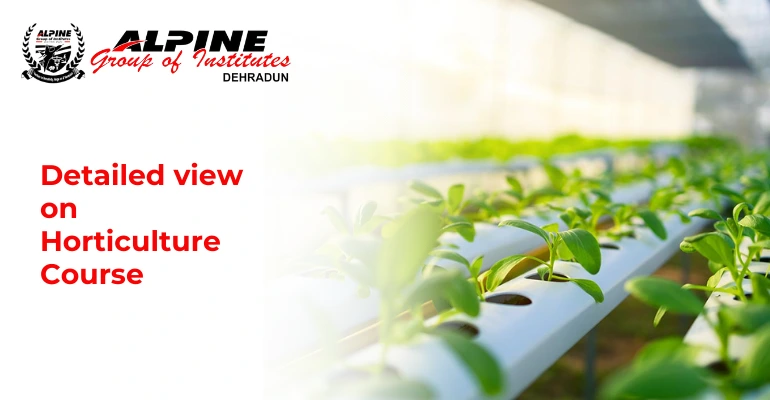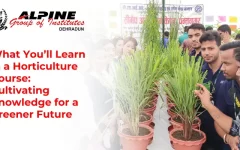Detailed view on Horticulture Course
2024-12-16 8:29Detailed view on Horticulture Course
Horticulture is a branch of agriculture focused on the cultivation of fruits, vegetables, flowers, nuts, seeds, herbs, sprouts, mushrooms, algae, and non-food crops like grass and medicinal plants. As the world faces challenges related to food security, climate change, and sustainable agriculture, the demand for skilled horticulturists is rapidly increasing.
What is Horticulture?
Horticulture is the science, art, and business of growing and cultivating plants for food, materials, comfort, and beauty. It involves a combination of crop management practices such as planting, breeding, harvesting, processing, and marketing of horticultural produce. Horticulturists are essential for producing high-quality food, maintaining landscapes, and ensuring ecological sustainability.
The scope of horticulture spans across several areas, including:
- Fruit and Vegetable Cultivation: Growing edible crops such as tomatoes, mangoes, and potatoes.
- Floriculture: Growing flowers for commercial use.
- Landscape Horticulture: Designing and maintaining parks, gardens, and green spaces.
- Post-Harvest Technology: Studying the handling, storage, and preservation of horticultural products.
- Plant Propagation and Breeding: Enhancing the quality of plants through breeding techniques.
Eligibility Criteria for Horticulture Courses in India
Horticulture courses in India are available at various levels: undergraduate (B.Sc./B.Tech), postgraduate (M.Sc.), and doctoral (Ph.D.). The eligibility for each of these programs differs slightly.
- Undergraduate Programs (B.Sc./B.Tech in Horticulture)
Eligibility:- Candidates should have completed their higher secondary education (10+2) with a background in Science (Biology, Chemistry, Physics/Mathematics).
- A minimum of 50% marks (varies by institution).
- Some institutions may have entrance exams like ICAR AIEEA for admission.
- Duration:
- Typically 3-4 years.
- Postgraduate Programs (M.Sc. in Horticulture)
Eligibility:- Candidates must have a Bachelor’s degree (B.Sc./B.Tech) in Horticulture, Agriculture, or related fields.
- A minimum of 50-60% aggregate marks in the undergraduate degree (can vary).
- Some universities require candidates to clear an entrance exam (e.g., ICAR AIEEA PG or institution-specific exams).
- Duration:
- 2 years.
- Doctoral Programs (Ph.D. in Horticulture)
Eligibility:- A Master’s degree (M.Sc./M.Tech) in Horticulture, Agriculture, or related fields.
- Minimum 55% marks at the postgraduate level.
- Candidates may need to clear entrance exams or interviews depending on the institution.
- Duration:
- 3-5 years.
Why is a Horticulture Course Essential?
Horticulture plays a key role in the agricultural and economic sectors by addressing several global challenges:
- Food Security: Horticulture contributes significantly to food production, including fruits, vegetables, and other edible crops. These are key components of a balanced diet and nutrition.
- Economic Growth: The horticulture sector is a major contributor to India’s agriculture economy. It supports employment in both rural and urban areas, with opportunities in farming, processing, packaging, and exporting.
- Sustainability and Environment: Horticulture promotes sustainable farming practices, organic farming, and soil conservation. Green spaces and landscaping help in improving air quality and maintaining biodiversity.
- Health and Wellness: Horticultural produce like fruits and vegetables are rich in essential vitamins, minerals, and antioxidants, playing a crucial role in public health.
- Climate Change Adaptation: Horticulturists are vital for developing resilient crops that can withstand changing climatic conditions. Their work includes improving drought resistance and adapting plants to new environments.
Fee Structure for Horticulture Courses in India
The cost of horticulture education in India can vary depending on whether the institution is public or private and the level of study. Below is an estimated breakdown of the fee structure:
- Undergraduate Programs (B.Sc./B.Tech in Horticulture)
- Public Universities:
Fees typically range from ₹20,000 to ₹50,000 per year in government-run institutions like the Indian Agricultural Research Institute (IARI) or State Agricultural Universities (SAUs). - Private Universities:
Private institutions may charge higher fees, ranging from ₹50,000 to ₹2,00,000 per year, depending on the university’s reputation and infrastructure.
- Public Universities:
- Postgraduate Programs (M.Sc. in Horticulture)
- Public Universities:
The fee for government institutions can range from ₹30,000 to ₹1,00,000 per year. - Private Universities:
Fees can vary from ₹1,00,000 to ₹3,00,000 per year in private institutions.
- Public Universities:
- Doctoral Programs (Ph.D. in Horticulture)
- Public Universities:
The annual fee for Ph.D. programs in public institutions can range from ₹20,000 to ₹1,50,000. - Private Universities:
The fee for private universities can range from ₹1,00,000 to ₹5,00,000 per year, depending on the university.
- Public Universities:
It’s also worth noting that some universities offer scholarships, fellowships, and financial assistance programs, especially for postgraduate and doctoral students, to help reduce the financial burden.
Career Opportunities After Horticulture Courses
Graduates of horticulture courses in India have a wide range of career opportunities, both in India and globally. Some of the major career paths include:
- Horticulturist: Cultivating and managing gardens, orchards, and farms, focusing on improving crop yield and quality.
- Plant Breeder: Working to develop new plant varieties with enhanced traits such as disease resistance, higher yield, or better quality.
- Agricultural Extension Officer: Providing guidance to farmers on the latest horticultural practices, crop management, and pest control.
- Floriculturist: Specializing in the cultivation and marketing of flowers for commercial purposes.
- Landscape/Garden Designer: Designing and maintaining green spaces in urban areas, parks, and private estates.
- Horticultural Consultant: Advising businesses, government agencies, or individuals on best practices for plant cultivation and pest management.
- Post-Harvest Technologist: Specializing in the storage, packaging, and transportation of horticultural produce to maintain quality and reduce spoilage.
- Seed Industry Professional: Working in the seed industry to develop and market improved varieties of seeds.
- Entrepreneurship: Starting your own business in horticulture, such as a nursery, organic farm, or flower shop.
Key Skills Acquired in Horticulture Courses
Horticulture students develop a diverse skill set, including:
- Crop Management: Knowledge of soil health, irrigation, pest management, and crop rotation.
- Plant Propagation: Techniques for breeding plants, grafting, and tissue culture.
- Landscape Design: Skills in designing aesthetically pleasing and sustainable green spaces.
- Post-Harvest Handling: Knowledge of proper harvesting, storage, and transportation methods to minimize crop loss.
- Research and Innovation: Conducting research on new horticultural techniques, pest control methods, and genetic improvement of plants.
- Entrepreneurship: Skills for managing a horticulture business, from production to marketing.
Conclusion
Horticulture is a field with immense potential in India, both in terms of career opportunities and contribution to food security and environmental sustainability. By pursuing a degree in horticulture, you can play a pivotal role in shaping the future of agriculture, developing sustainable farming techniques, and promoting healthier living. With a clear understanding of eligibility, qualifications, essentiality, and fees, prospective students can make informed decisions about pursuing horticulture courses in India. This field offers not only rewarding career opportunities but also the chance to contribute positively to society and the planet.






